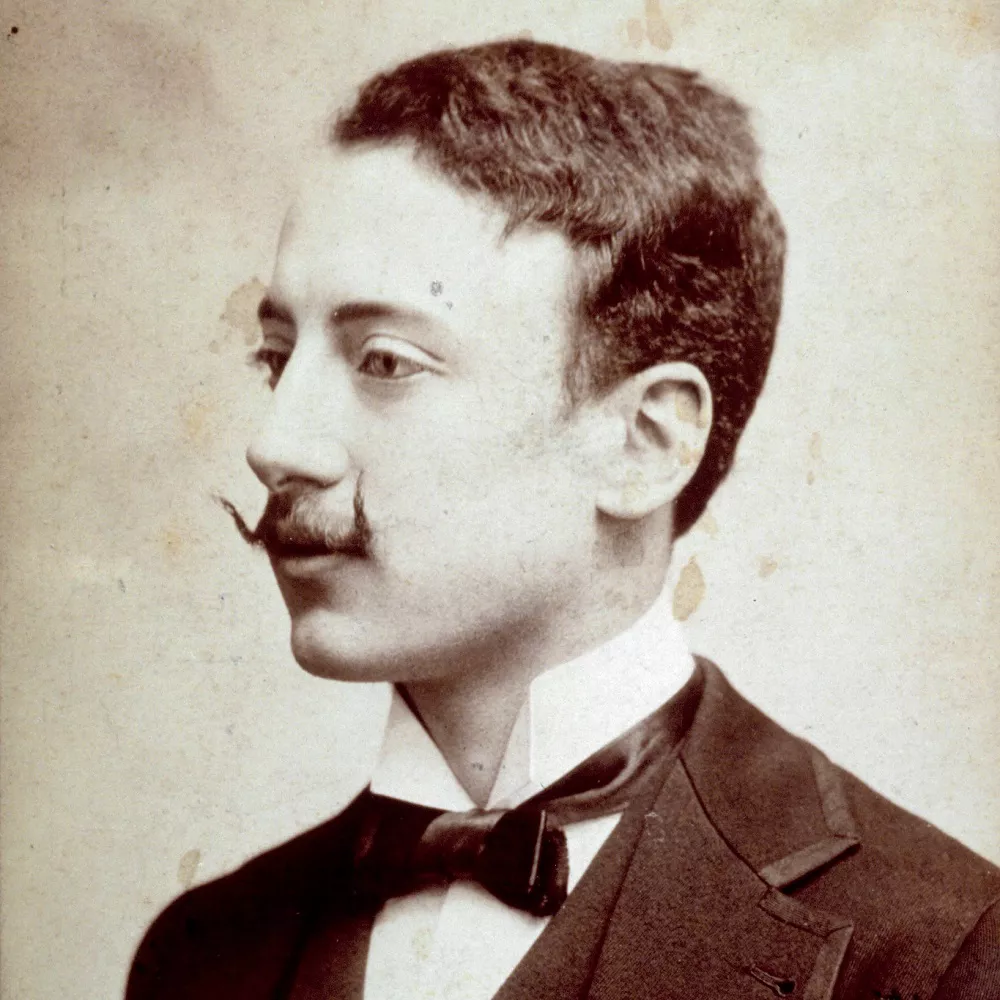
Gabriele D’Annunzio (1863–1938) was one of Italy’s most prominent poets, as well as a playwright, novelist, and nationalist figure. Known for his decadent style, D’Annunzio was a central figure in early 20th-century Italian literature, weaving themes of sensuality, politics, and patriotism into his works. His influence extended beyond poetry, impacting Italy’s political and cultural landscape during and after World War I.
Gabriele D’Annunzio Biography
Gabriele D’Annunzio was born on March 12, 1863, in Pescara, a small coastal town in central Italy. From a young age, he demonstrated remarkable talent in literature and the arts, attending the University of Rome, where he quickly became associated with the city’s intellectual elite. His early poetic works were heavily influenced by the Symbolist movement, blending a deep sense of aestheticism with a passion for personal expression.
D’Annunzio’s early career was marked by his powerful poetry, novels, and plays, which garnered him fame and respect. His literary works often reflected themes of decadence, beauty, and the fleeting nature of life. His first major success was Il Piacere (1889), a novel that delved into the complexities of sensuality and self-indulgence. This book became a hallmark of the Decadent movement in Italy, portraying a hedonistic worldview that both captivated and scandalized contemporary readers.
Throughout the 1890s, D’Annunzio continued to build his reputation as a master of poetic form. His collection Le Laudi (The Hymns), published in 1903, is widely considered his crowning achievement in poetry. Written in an epic style, Le Laudi expressed themes of existential longing, human striving, and the poet’s relationship with the divine. His later poetry took on a more nationalistic tone, as he became increasingly involved in Italian politics.
In the years leading up to World War I, D’Annunzio became a symbol of Italian militarism and national pride. His passionate speeches and writings stirred nationalist sentiments, and he eventually became involved in the war effort, leading a daring raid on the Austrian-held city of Fiume in 1919, which cemented his status as a hero to many Italians.
Despite his fame, D’Annunzio’s personal life was controversial. Known for his tumultuous relationships with women, he became a figure of fascination and scandal. His love affairs and extravagant lifestyle made him a constant subject of the press. Later in life, after World War I, he retreated to his villa on Lake Garda, where he lived in relative isolation, continuing to write until his death on March 1, 1938.
D’Annunzio’s legacy is complex. While his poetry remains a significant part of Italy’s literary canon, his political activities, including his association with fascism, have tarnished his reputation. Nonetheless, his impact on Italian culture, literature, and politics is undeniable.
Gabriele D’Annunzio Poems
Gabriele D’Annunzio Quotes
1. “The secret of life is to have no fear.”
2. “I live my life as a poet. Everything I do, I do with the soul of a ppoet.
3. “Every man is an artist, and every woman, the flame of his inspiration.”
4. “Beauty is the most powerful form of knowledge.”
5. “In nature, every moment is a miracle.”
6. “Love is the most beautiful revolution.”
7. “Death is not the end, it is the beginning of another existeence.
8. “The soul of a poet is like a vast ocean.”
9. “The sky is the limit for those who dare to dream.”
10. “In every man there is a poet waiting to be born.”
Gabriele D’Annunzio Facts
1. D’Annunzio was not only a poet but also a prolific writer, producing novels, plays, and essays.
2. He was a key figure in the Decadent movement in Italy, emphasizing beauty and individualism.
3. D’Annunzio’s involvement in the First World War and his suibsequent political activism shaped much of his later poetry.
4. His daring raid on Fiume in 1919 marked a turning point in his political career.
5. He had a notorious reputation for his relationships with weomen and his lavish lifestyle.
6. D’Annunzio was nominated for the Nobel Prize in Literature muItiple times but never won.
7. His work is characterized by a blend of sensuality, mysticism, and philosophical exploration.
8. He spent his later years in isolation at his villa on Lake Garda.
9. D’Annunzio was known for his theatrical and flamboyant public persona.
10. His influence extended beyond literature, shaping Italy’s ccultural and political identity during the early 20th century.
